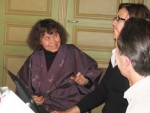Title
For the entire month of July this past summer, 55 young composers, conductors, and chamber musicians from across North America convened in Paris at L’École Normale de Musique Alfred Cortot to participate in the 12th annual summer session of the European American Musical Alliance. EAMA, founded by Juilliard faculty member Philip Lasser, is a program dedicated to fostering international artistic relationships and providing musical training in the tradition of the great Nadia Boulanger.
Body
From the 1920s until her death in 1979, musicians flocked to France to study with Boulanger, whose students included Aaron Copland, Elliott Carter, Philip Glass, and many others among the most important composers and teachers of the 20th century (including Juilliard faculty members Lasser and Mary Anthony Cox). For this reason, Paris might be called the “source of the Nile” of American music, and studying directly with Boulanger’s colleagues and disciples was an incredibly inspiring and humbling experience.
As an American born after the heyday of legendary Parisian musical life, I wondered if my trip there would be anything more than symbolic. I was immediately and pleasantly surprised to find the tradition uninterrupted, and several generations of its players present and full of vitality. It was incredible to hear Michel Merlet, with whom I was studying privately, reminisce about sitting in Messiaen’s harmony lectures alongside classmates Pierre Boulez and Iannis Xenakis. Every room oozed history—the beautiful Pleyel piano on which we plunked out our daily counterpoint exercises had been previously owned by Franz Liszt and Alfred Cortot—and we were instantly included in the tradition.
The two guest composers were Robert Beaser, chairman of Juilliard's composition department, and the famed (and famously private) composer Sofia Gubaidulina. Her weeklong residency afforded a rare opportunity to become acquainted with a very special and intriguing artist, and to hear stories of musical life behind the Iron Curtain. She explained, for example, that she preferred not to give master classes because they require making decisions quickly, and hasty decisions about art were too frequently destructive in Soviet times. Instead, she encouraged thoughtful and honest discussions about time, music, and humanity.
I had the opportunity to take an after-hours tour of IRCAM, an institute established by Pierre Boulez in the 1970s dedicated to the study of musical acoustics. This facility, which is typically off limits to the public, has been a fertile ground for avant-garde composers for several decades, and has witnessed the creation of new works by John Cage, Luciano Berio, and Tristan Murail. The pièce de résistance was an anechoic chamber—a small room which is specially created so that sound does not reverberate. My guide invited me to stand inside alone and listen to the sounds of my heart and circulation. As a practical joke, I suppose, he locked the door behind me and left me to sweat for a few minutes in a room where, literally, no one can hear you scream.
Other highlights included a private tour of Ravel’s house (which has been left exactly as it was at the time of his death in 1937), during which we were allowed to spend time in the studio in which Boléro was written and to play his piano. We also attended Bastille Day celebrations in Paris, the musical selections for which were amusingly incongruous: Barber’s Violin Concerto blared across the Champs de Mars in a nearly continuous loop, occasionally pausing for a rendition of “Nessun Dorma” or “Summertime.” I had learned the words to La Marseillaise, but the closest we ever got to French music was the “Habañera” from Carmen.
July also saw the premiere of The Fly, a new opera by American composer Howard Shore, with a libretto by the playwright David Henry Hwang, conducted by Plácido Domingo at Paris’s Théâtre du Châtelet. Based on the science fiction movie of the same title (which, in turn, was based on a 1957 short story by George Langelaan), in which a brilliant young scientist accidentally turns himself into a fly, the work was far from the musical language of Shore’s Academy Award-winning score to The Lord of the Rings. It was also far from good. I could not agree more with Anthony Tommasini, who, in a recent review of the opera in The New York Times, wrote: “The Fly is a ponderous and enervating opera, and the problem is Mr. Shore’s music. Mr. Shore … may have a good opera in him. This is not it.” I thought something was horribly wrong with my French language skills when I read the following sentence in the synopsis: “Our protagonist realizes something is wrong with his teleportation device when his pet baboon is turned into soup.” Sadly, I realized I was not mistaken and that this was a story that could not be saved, even by gratuitous violence and nudity.
Then there were the lingering questions about daily life in France: Why must we always pay in exact change? Why do fried eggs keep showing up on pizza? Why are bathrooms so different in other countries, while human anatomy never changes? Why is wine cheaper than water? How can everyone eat so much cheese and stay so thin?
It is difficult to convey what a month in France does to a person, which is why, whenever I’m asked about my trip, I can only smile. Even someone as acutely aware of cliché as I cannot help but fall in love with the place, and although the Lost Generation may be gone forever, there will always be new generations to lose and to find themselves in Paris.





